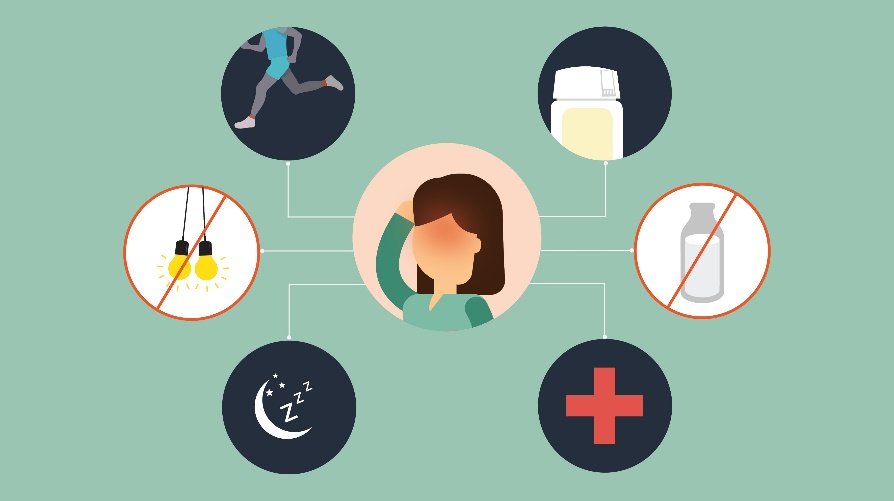How To Safely Deal With Migraines During Pregnancy
If you are experiencing bouts of migraine during pregnancy, then you are not alone. Around 15 to 20 percent of pregnant women suffer from migraine, which are intense headaches quite different from tension and stress headaches we usually get.
If you are experiencing bouts of migraine during pregnancy, then you are not alone. Around 15 to 20 percent of pregnant women suffer from migraine, which are intense headaches quite different from tension and stress headaches we usually get.
They mostly begin as a dull ache, later turning into a constant, throbbing, pulsating pain in the head. According to some studies, there is a relation between fluctuating hormone levels and migraines, especially during the first trimester, when the hormone levels haven’t yet stabilized.
If you suffer from intense migraines during pregnancy, consult a doctor before taking any medications, as it can adversely affect the baby and mother.
You can consult Dr. Bharati Hiremath a leading gynecologists in Pune at Nisha Women’s Hospital. She excels in high-risk pregnancy, infertility treatments, and treating and managing various gynaecological disorders and conditions.
What are the causes of migraine during pregnancy?

The exact reason for migraine is unknown, but it can run in the family. Changes in the hormone levels during pregnancy are considered one of the factors for migraine, another being an increase in blood volume in the first trimester.
Some common triggers include:
- Stress
- Lack of sleep
- Strong odors
- Certain foods
- Bright, intense light
- Not being hydrated
- Changes in weather
Dr. Bharati Hiremath an experienced gynecologist in pune recommends keeping track of your migraine headaches by maintaining a diary. Mention when it started, how long it lasted, and what triggered it. This will help in pinpointing the triggers which you can avoid.
What are the symptoms of a migraine attack?
Apart from intense, throbbing pain mostly on one side of the head, you may experience:
- Vomiting
- Sensitivity to lights and sounds
- Nausea
- Dizziness
- Auras
- Difficulty in focusing
- Blurred vision
Migraines are basically not harmful unless they may be a sign of some underlying condition. It is better to talk to your doctor about your headaches and let them know the details.
Natural remedies for migraine

Pregnancy symptoms can worsen your migraine in the first three months of your pregnancy.
Dehydration and low blood sugar levels can result from morning sickness, which might make you feel like eating and drinking less. If you’re not careful, this could trigger your migraines.
To avoid this, you should eat small, frequent meals and keep sipping water regularly. This can also reduce your morning sickness.
In addition, you can include other remedies, like:
Take a nap:
A power nap can ease your migraine and make you feel better.
Dark room:
You tend to become sensitive to bright lights and sound during migraine attacks. Draw your curtains, switch off the lights, turn off the electronics, and rest for some time.
Cold pack:
Placing a damp towel or a cold pack on your head reduces the pain. The cold pack helps constrict the blood vessels.
Care for yourself:
Tiredness, inadequate sleep, not eating well, and dehydration can trigger migraine attacks. You can overcome it by maintaining a balanced healthy lifestyle.
Relaxation techniques:
Relaxing the muscles of your neck, back, and head can release the pressure causing migraines. Find out from your doctor the safe relaxation exercises you can do during pregnancy.
How to treat migraines if home remedies don’t work?
Seek medical advice before taking any medicines for migraine if you are pregnant. You should avoid certain medications during pregnancy or if you plan to conceive.
According to research, paracetamol sold under many brand names is safe to use as they cause the most negligible adverse effects during pregnancy.
If you suffer from regular bouts of migraine that are unbearable, you should discuss with your gynecologist medications that are safe to take while pregnant.
Dr. Himali Maniar, a gynecologist in Bopal, Ahmedabad, does not recommend taking aspirin, ibuprofen, or NSAIDs as they can cause harm to both the mother and the unborn child while pregnant.
Furthermore, she asks pregnant women to be careful while using herbal remedies to alleviate migraine as they may not be tested and could cause complications.
Can migraine cause complications during pregnancy?
According to some studies, pregnant women with migraine issues are prone to certain risks, such as:
- Higher chances of caesarean delivery
- Low weight of the baby during delivery
- High blood pressure can result in preeclampsia during pregnancy
When should you seek immediate medical care?
It is always better to be aware as early care can prevent severe complications. If you observe any of these conditions, please get in touch with your doctor:
- Severe headache
- Headache that lasts for long
- Headache accompanied by high blood pressure
- Headache along with sensitivity to sound and light or blurry vision
Generally, most pregnant women having migraine issues will be fine. However, recognizing your headache and treating it is preferable rather than ignoring it.







